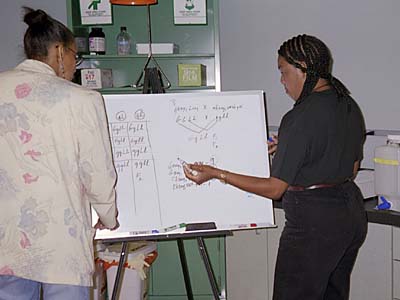Because the laboratory exercises encompass the many topics covered in the course, much of the workshop focusses on hands-on training in the laboratory experiments. Invited speakers cover additional topics relevant to the study of genetics. Student Fellows who provide assistance in the classrooms during the course also participate in the Institute, assisting with the experimental work and getting to know the teachers they will be working with during the year.
Concepts covered include Mendelian genetics, pedigree analysis and genetic diseases, and applications and ethics of genetic technology.
Participants learn how to collect and manipulate Drosophila melanogaster in experiments of genetic crosses, extract DNA, perform gel electrophoresis, transform bacteria with plasmid DNA, and purify protein.
Teachers learn culture techniques, microbe isolation and identification, chemical means to control bacterial growth, action of antibiotics, principles of epidemiology, and virus replication and transmission.
Below: Genetics teachers determine the offspring of a dihybrid cross in Drosophila Lab.

Currently, the Institutes are open to BCS teachers, but may be extended at a later date to other teachers wishing to teach the CORD/BCS genetics curriculum. Applications must be submitted in the Spring and participants are selected by CORD and BCS. Those selected are provided a stipend.
Center for Community OutReach Development
The University of Alabama Birmingham
933 19th Street South (CHSB 503)
Birmingham, AL 35294-2041
Phone - (205) 934-5171
Fax - (205) 934-5158
Email - CCORD@uab.edu
